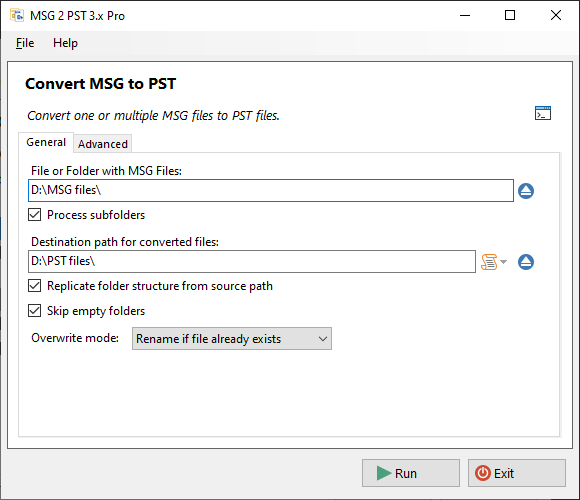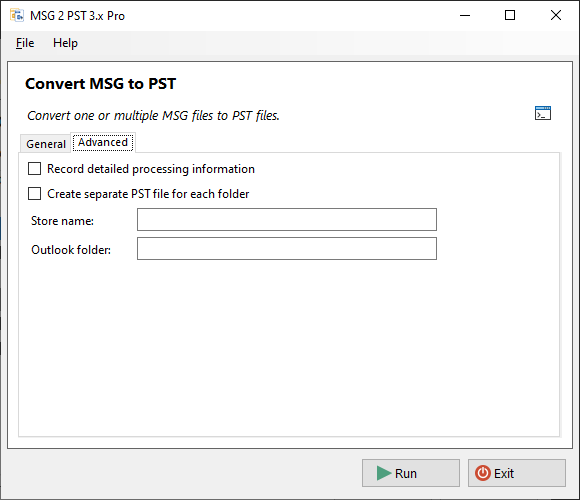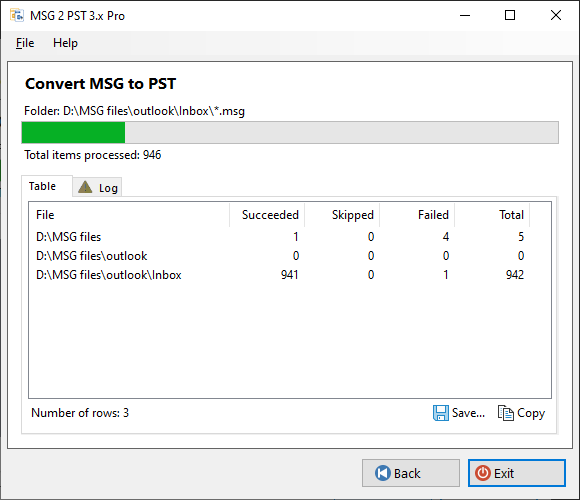How to convert MSG to PST files?
This utility converts Outlook MSG files to PST format, with no limitations on the size or number of files to be converted. To convert MSG messages into PST file, follow these steps:
-
Choose a file or folder with MSG files
-
Select the destination path for the resulting PST file
-
Optionally, customize additional settings:
- Process subfolders
- Replicate the original folder structure from the source path
- Overwrite mode for existing files
-
Click "Run" to convert your MSG files
MSG to PST Portable Version (.zip) - No installation required
Usage: msg2pst-cli [command] [options]
Command: convert pst
Description: Convert MSG files to PST format
Options:
-f, --file Required. Path to the file(s) to be converted, supporting wildcard characters (*?).
-r, --recursive Process subfolders recursively.
-q, --query Search query for filtering messages.
-p, --path Destination path for PST files.
-v, --verbose Display detailed processing information on your screen.
--atchm-only Export only attached emails.
--mkdir Create an individual directory for each exported file.
--srcfolders Preserve the source folder structure.
--empty Include empty folders in the export.
--storename Specify the display name of the new Outlook data file.
--folder (Default: Inbox) Destination Outlook folder for exported folders and items.
--split Create dedicated PST files for each folder.
--mode (Default: rename) Overwrite mode. Valid values: rename, append
Converting MSG to PST using PowerShell
MSG to PST Converter offers command line options for converting emails from .msg files to PST format. To start the export, use the convert pst command followed by various options.
One of the key features is the ability to apply a search query to filter messages based on specific criteria, utilizing search keywords and boolean search operators. This allows users to extract only the relevant items they need, saving time and effort.
- Support different naming conventions and macros for exported files
- Convert attached emails
- Outlook installation is required
Features
Standalone & Installer versions
MSG 2 PST can be used as a portable application or installed as a Windows application. Choose the option that best suits your workflow needs.
Microsoft Outlook Requirement
Microsoft Outlook must be installed on your computer to convert MSG files to PST format. Note that cloud-based Microsoft 365 (formerly Office 365) does not support PST exports.
Choose between 32-bit and 64-bit Outlook
We provide both 32-bit and 64-bit versions of the software to match your Microsoft Outlook installation. Make sure the version you select corresponds to the bitness of Outlook, not the Windows OS.
Offline Conversion
The MSG to PST converter tool does not require internet access, and all data generated by this software is stored exclusively on your device.
PowerShell and Command-Line Application
This option is available exclusively for Technician license users, enabling the software to be run using PowerShell or as a command-line application for enhanced functionality and automation.
Maintain the Original Folder Structure
Our MSG to Outlook Converter allows you to convert multiple MSG files to PST format in a single operation, while preserving the original folder structure.
Preserve All Mail Properties
During conversion, the utility saves all supported message data in the PST format, including attachments, embedded emails, signed certificates, and more.
No Limits on the Number or Size of Resulting Files
There are no restrictions on the number of resulting files or files to be converted. Convert an unlimited number of folders or files as often as needed.
1-Click Email Converter
Convert MSG to Outlook in single click. The program generates report for the data conversion process.
Compatible with all Outlook versions
Convert MSG files to Outlook 2024, Outlook 2021, Outlook 2019, Outlook 2016, Outlook 2013, Outlook 2010 and 2007.
Frequently Asked Questions
Have questions about MSG to PST Converter? Check out our answers to frequently asked questions below to get started!
-
Download MSG File Converter to PSTDownload and install the MSG to PST Converter.
-
Locate Your MSG FilesIdentify the directory where your .msg email files are stored.
-
Convert MSG Files to PST FormatOpen the converter, browse for your MSG files, configure the conversion settings, and click "Run." Wait for the process to finish.
-
Open the PST File in OutlookRestart Outlook, open the converted PST file, and access the imported folders. Your MSG emails will now appear in the Outlook folders list.
Note: The evaluation version exports up to 15 emails per folder.
- MSG: A Microsoft Outlook-specific format for individual emails. It stores additional Outlook-specific data, like contacts and calendar events, making it ideal for use in Microsoft environments.
- EML: A standard format for single emails, compatible with various email clients like Thunderbird and Apple Mail. It includes the full email content, attachments, and headers.



